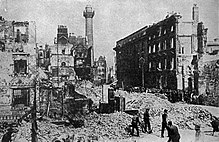Opposition to the war

Once war was declared, many socialists and trade unions backed their governments. Among the exceptions were the Bolsheviks, the Socialist Party of America, the Italian Socialist Party, and people like Karl Liebknecht, Rosa Luxemburg, and their followers in Germany.
Benedict XV, elected to the papacy less than three months into World War I, made the war and its consequences the main focus of his early pontificate. In stark contrast to his predecessor, five days after his election he spoke of his determination to do what he could to bring peace. His first encyclical, Ad beatissimi Apostolorum, given 1 November 1914, was concerned with this subject. Benedict XV found his abilities and unique position as a religious emissary of peace ignored by the belligerent powers. The 1915 Treaty of London between Italy and the Triple Entente included secret provisions whereby the Allies agreed with Italy to ignore papal peace moves towards the Central Powers. Consequently, the publication of Benedict's proposed seven-point Peace Note of August 1917 was roundly ignored by all parties except Austria-Hungary.
In Britain in 1914, the Public Schools Officers' Training Corps annual camp was held at Tidworth Pennings, near Salisbury Plain. Head of the British Army, Lord Kitchener, was to review the cadets, but the imminence of the war prevented him. General Horace Smith-Dorrien was sent instead. He surprised the two-or-three thousand cadets by declaring (in the words of Donald Christopher Smith, a Bermudian cadet who was present),
that war should be avoided at almost any cost, that war would solve nothing, that the whole of Europe and more besides would be reduced to ruin, and that the loss of life would be so large that whole populations would be decimated. In our ignorance I, and many of us, felt almost ashamed of a British General who uttered such depressing and unpatriotic sentiments, but during the next four years, those of us who survived the holocaust—probably not more than one-quarter of us—learned how right the General's prognosis was and how courageous he had been to utter it.
Voicing these sentiments did not hinder Smith-Dorrien's career, or prevent him from doing his duty in World War I to the best of his abilities.
Many countries jailed those who spoke out against the conflict. These included Eugene Debs in the United States and Bertrand Russell in Britain. In the US, the Espionage Act of 1917 and Sedition Act of 1918 made it a federal crime to oppose military recruitment or make any statements deemed "disloyal". Publications at all critical of the government were removed from circulation by postal censors, and many served long prison sentences for statements of fact deemed unpatriotic.
A number of nationalists opposed intervention, particularly within states that the nationalists were hostile to. Although the vast majority of Irish people consented to participate in the war in 1914 and 1915, a minority of advanced Irish nationalists staunchly opposed taking part. The war began amid the Home Rule crisis in Ireland that had resurfaced in 1912, and by July 1914 there was a serious possibility of an outbreak of civil war in Ireland. Irish nationalists and Marxists attempted to pursue Irish independence, culminating in the Easter Rising of 1916, with Germany sending 20,000 rifles to Ireland to stir unrest in Britain. The UK government placed Ireland under martial law in response to the Easter Rising, though once the immediate threat of revolution had dissipated, the authorities did try to make concessions to nationalist feeling. However, opposition to involvement in the war increased in Ireland, resulting in the Conscription Crisis of 1918.
Other opposition came from conscientious objectors—some socialist, some religious—who refused to fight. In Britain, 16,000 people asked for conscientious objector status. Some of them, most notably prominent peace activist Stephen Henry Hobhouse, refused both military and alternative service. Many suffered years of prison, including solitary confinement and bread and water diets. Even after the war, in Britain many job advertisements were marked "No conscientious objectors need apply".This quote needs a citation
The Central Asian Revolt started in the summer of 1916, when the Russian Empire government ended its exemption of Muslims from military service.
In 1917, a series of French Army Mutinies led to dozens of soldiers being executed and many more imprisoned.
On 1–4 May 1917, about 100,000 workers and soldiers of Petrograd, and after them, the workers and soldiers of other Russian cities, led by the Bolsheviks, demonstrated under banners reading "Down with the war!" and "all power to the soviets!" The mass demonstrations resulted in a crisis for the Russian Provisional Government. In Milan, in May 1917, Bolshevik revolutionaries organised and engaged in rioting calling for an end to the war, and managed to close down factories and stop public transportation. The Italian army was forced to enter Milan with tanks and machine guns to face Bolsheviks and anarchists, who fought violently until 23 May when the army gained control of the city. Almost 50 people (including three Italian soldiers) were killed and over 800 people arrested.
In September 1917, Russian soldiers in France began questioning why they were fighting for the French at all and mutinied. In Russia, opposition to the war led to soldiers also establishing their own revolutionary committees, which helped foment the October Revolution of 1917, with the call going up for "bread, land, and peace". The Decree on Peace, written by Vladimir Lenin, was passed on 8 November 1917, following the success of the October Revolution. The Bolsheviks agreed to a peace treaty with Germany, the peace of Brest-Litovsk, despite its harsh conditions. The German Revolution of 1918–1919 led to the abdication of the Kaiser and German surrender.
Comments
Post a Comment